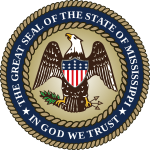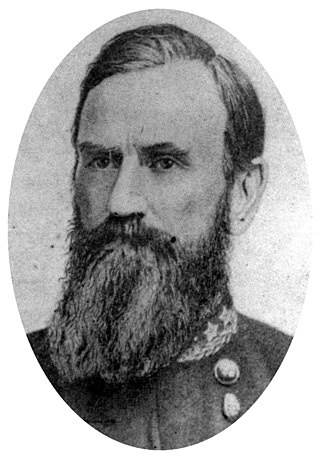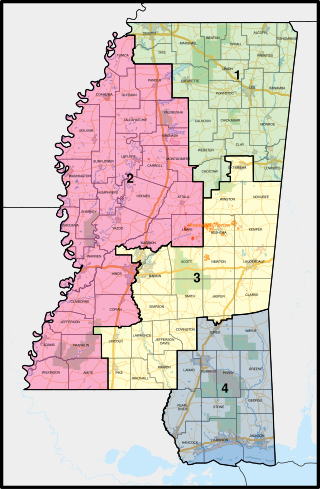Mississippi elected its member August 7, 1826.
| District | Incumbent | This race | |||
|---|---|---|---|---|---|
| Member | Party | First elected | Results | Candidates | |
| Mississippi at-large | William Haile | Jacksonian | 1826 (Special) | Incumbent re-elected. |
|
| Elections in Mississippi |
|---|
 |
Mississippi elected its member August 7, 1826.
| District | Incumbent | This race | |||
|---|---|---|---|---|---|
| Member | Party | First elected | Results | Candidates | |
| Mississippi at-large | William Haile | Jacksonian | 1826 (Special) | Incumbent re-elected. |
|

Benjamin Grubb Humphreys was an American politician from Mississippi. He was a general in the Confederate States Army during the American Civil War and served as Governor of Mississippi from 1865 to 1868, during Reconstruction.

The 19th United States Congress was a meeting of the legislative branch of the United States federal government, consisting of the United States Senate and the United States House of Representatives. It met in Washington, D.C. from March 4, 1825, to March 4, 1827, during the first two years of John Quincy Adams's presidency. The apportionment of seats in the House of Representatives was based on the 1820 United States census. The Senate had a majority of Jackson Men, while the House had an Anti-Jackson (pro-Adams) majority.

These are tables of congressional delegations from Mississippi to the United States House of Representatives and the United States Senate.

The 1826–27 United States House of Representatives elections were held on various dates in various states between July 3, 1826, and August 30, 1827. Each state set its own date for its elections to the House of Representatives before the first session of the 20th United States Congress convened on December 3, 1827. They occurred during John Quincy Adams's presidency. Elections were held for all 213 seats, representing 24 states.
Mississippi's 3rd congressional district (MS-3) covers central portions of state and stretches from the Louisiana border in the west to the Alabama border in the east.
Elza Jeffords was a U.S. Representative from Mississippi's 3rd congressional district.

Elections are held every year in the US state of Mississippi.

The 1826–27 United States Senate elections were held on various dates in various states. As these U.S. Senate elections were prior to the ratification of the Seventeenth Amendment in 1913, senators were chosen by state legislatures. Senators were elected over a wide range of time throughout 1826 and 1827, and a seat may have been filled months late or remained vacant due to legislative deadlock. In these elections, terms were up for the senators in Class 1.

Pennsylvania elected its members October 10, 1826.
Massachusetts elected its members November 6, 1826. It required a majority for election, which was not met on the first vote in 3 districts requiring additional elections held March 5 and May 14, 1827.

On May 1, 1826, Alexander Thomson (J) of Pennsylvania's 13th district resigned. A special election was held to fill the resulting vacancy on October 10, 1826, the same day as the general elections to the 20th Congress.

Maine elected its members September 8, 1826. It required a majority for election, which was not met in the 7th district, requiring additional elections December 18, 1826, April 2, and September 27, 1827.

Ohio elected its members October 10, 1826.

Vermont elected its members September 5, 1826. It required a majority for election, which was not met on the first vote in two districts, requiring additional elections held December 4, 1826 and February 5, 1827.

Kentucky elected its members August 6, 1827, after the term began but before the new Congress convened.

A special election was held in Mississippi's at-large congressional district on July 11, 1826, to fill a vacancy caused by the death of Christopher Rankin (J) on March 14, 1826

A special election was held in Ohio's 10th congressional district on October 10, 1826, the same day as the general elections for the 20th Congress, to fill a vacancy caused by the resignation of David Jennings (A) on May 25, 1826.
The 1826 United States elections occurred in the middle of Democratic-Republican President John Quincy Adams's term. Members of the 20th United States Congress were chosen in this election. The election took place during a transitional period between the First Party System and the Second Party System. With the Federalist Party no longer active as a major political party, the major split in Congress was between supporters of Adams and supporters of Andrew Jackson, who Adams had defeated in the 1824 Presidential election.

The 2016 United States House of Representatives elections in Mississippi were held on November 8, 2016, to elect the four U.S. representatives from the state of Mississippi, one from each of the state's four congressional districts. The elections coincided with the 2016 U.S. presidential election, as well as other elections to the House of Representatives, elections to the United States Senate and various state and local elections. The primaries were held on March 8.